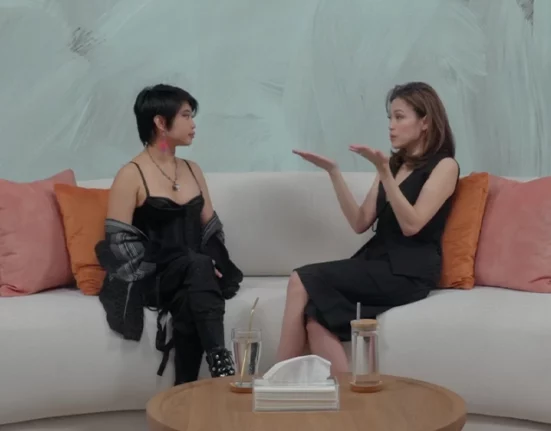FOLLOWING an interview with adult content creator, Salome Salvi, conducted by host Toni Gonzaga, the internet seems to have split in two given the pair’s discussion on sex work.
Salome Salvi is most known for posting adult content on social media websites like X (formerly Twitter.) At present, she has an Onlyfans account and also works as an actress at Vivamax.
In her interview, Gonzaga asked her questions about her life and her profession, particularly why she chose to pursue sex work given the conservativeness of her country.
Salvi on ToniTalks
Salvi’s journey in sex work began when she became a member of the Alter community, a community online who express themselves sexually. Here, she would post nude photos and videos of herself, serving as an outlet for her in terms of sex.
It was in 2020 that Salvi started capitalizing on her platform of over 30, 000 followers on X, as she didn’t have a job at the time. She then made an OnlyFans account, telling her followers on X that if they wanted to see more, they would have to check out her OnlyFans.
Aside from this, she also works with Vivamax and GMA, starring in shows and films like “Ahass,” “Backpackers,” “Black Rider,” “Sex Hub,” “Sssshhh!,” and “Kitty K7. “
Often the people she’s with in her videos are fellow content creators, and at present, sex work is something she feels she’ll be doing indefinitely, as it’s something very close to her heart.
“Yung love ko for visual art, and yung creative hunger na nafe-feel ko, napupunan yun nung porn,” she said.
“All of that really scratches my creative itch.”
When asked how she separates the physical and emotional part of sex with what she does, Salvi explained that she also sees sex work as “companionship work.”
“We have to empathize with the loneliness that your clients feel,” she added.
As such, she often compartmentalizes and separates these parts of sex with what she does.
Finding her inner child
Salvi also talks about how a big part of the growth she’s experiencing right now stems from her acknowledging her inner child, as well as honoring her with the things she wanted but didn’t get, such as positive attention and reinforcement.
“I came from a narcissistic household,” she explained.
She explained that when narcissists feel bad, they often want everyone around them to feel bad as well. So growing up with narcissistic parents, she was often bullied as a child for her looks and her decisions in life, with them humiliating her even when they had guests over.
She was also physically abused by someone outside her family, but it was the verbal abuse that broke her. And when she told them she’d been physically abused, her parents didn’t believe her, even continuing to invite him over despite her protests.
For Salvi, her parents were her first bullies, and down the line, it led to a lot of issues with herself, such as developing body dysmorphia.
“Naniwala ako na mamamatay akong virgin at walang nagmamahal [sa’kin,] kasi araw-araw dinidikdik sa’kin that I don’t deserve that because I’m ugly,” she said.
The only time she would receive positive reinforcement was with her grades, or when her parents could brag that she was a gifted child.
Now, Salvi feels that she’s developed a bit of impostor syndrome as she’s grown – that she doesn’t deserve the things she’s achieved despite how hard she works.
She added: “I learned eventually na hindi ko na maaasahan yung magulang ko to be the parents that I deserved as a child, [so] it’s now up to me to parent myself, and that is the hardest thing that I’ve had to do for myself.”
At present, Salvi’s focusing on bettering herself and on her journey of self-love, and is putting that above any thoughts about relationships or marriage moving forward.
“I feel like once I learn how to get there, I wouldn’t need the partner to make myself happy,” she said.
“I know now that nobody’s gonna love me better than I love myself.”
The rise of sex work in the Philippines
Since the release of the video, a surprising amount of support has been shown for Salvi despite the conservative nature of many Filipinos. People in Gonzaga’s comments stated that sex shouldn’t be a taboo topic and that it was great of the two of them to open up a discussion on the matter. Others even stated that this was the best of Toni Talks so far.
Many also praised Salvi for how well-spoken she was, empathizing with her stories, so much so that they started crying while listening to the interview.
At present, after 21 hours of being posted on YouTube, the video has garnered over 628, 000 views and 20, 000 likes.
After the Philippine Star posted a screencap of the video to their page, many comments also urged others not to judge Salvi, especially if they didn’t understand what she was dealing with.
Others, however, were quick to question why Salvi was proud of her line of work, and even that she should be ashamed of what she does, telling her that she should pursue a different profession instead.
At present, under Article 202 of the Revised Penal Code, sex work is still considered to be a crime in the Philippines. However, this doesn’t mean that there aren’t a large amount of sex workers within the country.
Many sex workers explain that those who partake in it aren’t forced into it; instead, it allows them to gain income.
Some argue that they are against the legalization of sex work for religious reasons, while others reason that many who go into sex work are often exploited due to living in poverty.
In 2013, it was found that there were about 500, 000 sex workers in the Philippines. One can only imagine how that number has grown since then.
The debate on whether or not sex work really is work continues on until today. 23-year-old Mxpa, however, sees the likes of Salome Salvi, who choose to become sex workers, as the privileged few.
That isn’t the reality for many other sex workers in the country, though, who often get into the profession due to poverty or abuse. For Mxpa – who has chosen not to give his real name – sex workers do this not because they choose to, but because they have to as a means of survival.
He reminds people of the history of the Philippines, wherein it was once a popular destination for prostitution and human trafficking, with people’s bodies often being exploited without their full consent.
“Nagsimula ang “sex work is work” advocacy sa Western countries kasi they’re criminalized by institutions, hindering them to work, as well as being stigmatized because of the nature of their work,” he explained further.
“As Filipinos, napansin ko lang na ang bilis natin sumakay sa bandwagon ng advocacy na iyon without putting into context our own country’s issues of sex work, prostitution, and its socio-economic complexities.”
He adds: “Sa lipunang mahirap, hindi choice ng tao ang sex work.”









